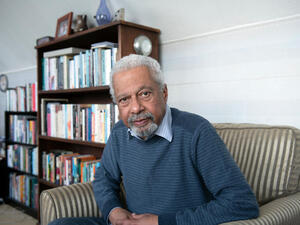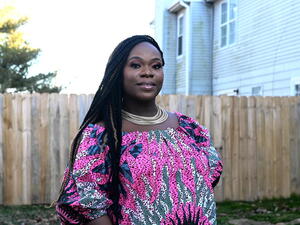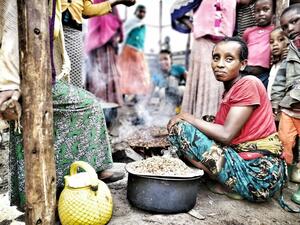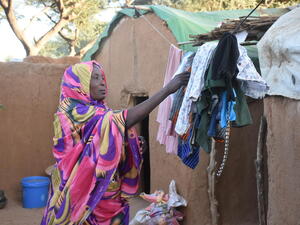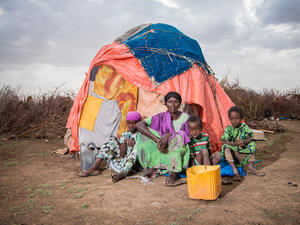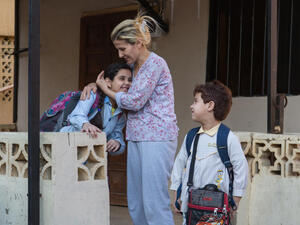High Commissioner urges strong international support for African Union efforts in Darfur
High Commissioner urges strong international support for African Union efforts in Darfur

Refugees from South Sudan welcome UNHCR's High Commissioner António Guterres as he arrives at Sherkole camp in Western Ethiopia. Some refugees have said they are keen to return to South Sudan when UNHCR's organised repatriation from Ethiopia starts next February.
ADDIS ABABA, Dec. 19 (UNHCR) - Concluding a two-day visit to Ethiopia, UN High Commissioner for Refugees António Guterres today strongly urged the international community to bring greater support to both the peace process and the African Union peacekeeping role in Sudan's strife-torn Darfur region. Guterres pledged UNHCR's support to the AU in achieving success in this difficult yet necessary mission.
"The success or failure of the Darfur process has the potential to make or break the stability in the whole region, if not the whole continent," the High Commissioner told reporters at UNHCR's office in Addis Ababa on Monday evening.
Earlier, he told Alpha Oumar K Konaré, President of the Commission of the African Union that "the world should help the African Union succeed in Darfur, and I will personally be your advocate for the international community not to shy away from its responsibilities."
Professor Konaré acknowledged that not everything had been done, even on the part of the African countries themselves, to advance the African Union's peace agenda, particularly in the Darfur situation. He said Darfur was a "test case" for the AU's new conflict-prevention and peace building architecture for Africa.
The two leaders also discussed their common vision of a strong African political integration, for which High Commissioner Guterres expressed his admiration. The two also committed themselves to strengthening their organisations' cooperation. They also resolved to jointly approach donors with creative projects to address the gap between short-term humanitarian relief and longer-term development assistance.
"The funds always come too late," said Guterres, alluding particularly to the Southern Sudan situation, where reconstruction should have started early on to allow for the sustainable return of displaced people and the recovery of the country.
On Sunday, Guterres visited some 16,000 Sudanese refugees at Sherkole refugee camp in western Ethiopia and heard their concerns about the absence of basic infrastructure, including health and education, and the presence of landmines in their areas of return.
"You may be worried about the situation back home, doubtful about what would await you and uncertain of the future," Guterres told the refugees. "But UNHCR will organize a mission for your representatives to go and see the situation at home and allow your people to make an informed decision (on going home)."
Organised repatriation to South Sudan from Ethiopia is due to start in February next year, after the signature of a tripartite agreement between Ethiopia, Sudan and UNHCR. Some 14,000 Sudanese refugees, out of the 73,000 hosted in the five camps for Sudanese in Ethiopia, have expressed their intention to return immediately. The first UNHCR-assisted return of Southern Sudanese from Kenya began over the weekend.
The High Commissioner assured regional officials that UNHCR would help in restoring the environment in areas that have hosted refugees.
Guterres held separate talks with Ethiopian Prime Minister Meles Zenawi and Foreign Minister Seyoum Mesfin on issues of mutual interest, including the repatriation to South Sudan. He expressed appreciation for the hospitality Ethiopia has shown to hundreds of thousands of refugees over the decades. Prime Minister Meles recognised UNHCR's support to Ethiopia, and expressed his satisfaction at the planned return of Somali refugees currently in Ethiopia.
Foreign Minister Seyoum assured the High Commissioner of Ethiopia's support to the tripartite agreement and the South Sudan repatriation operation.
Guterres, accompanied by UNHCR's Geneva-based Africa Bureau Director, Ms. Marjon Kamara, also met with the UN country team. He deplored the frequent unpredictability of funding for Africa - a perennial problem for UNHCR and its partners.
"Money follows television," he said. "Unfortunately television does not often come to Africa."
Before arriving in Ethiopia, the UNHCR delegation spent one day in Uganda, where they met President Yoweri Museveni and discussed the situation of internally displaced persons in that country.
By Delphine Marie
with Kisut Gebre Egziabher and Katherine Cocco in Addis Ababa, Ethiopia


